




https://torontolife.com/memoir/after-my-husband-tried-to-kill-me-iwas-forced-to-flee-kenya-eight-years-later-im-still-fighting-for-justice
Written by Ciro Muiruri (published for Toronto Life)I was born in a bustling Nairobi slum called Kawangware. Vendors lined every inch of its narrow streets, selling meat, fruit, fish, used clothes, cheap dishware and more. It was never quiet there. The air was always filled with sounds of haggling shoppers and shopkeepers, soaring music from the market stalls, and honking matatus shuttling people from one destination to the next. As a kid, I would run through the winding streets with my friends, playing with toys we made out of trash. We teetered on tin-can stilts, raced old tires and hurled ourselves across open sewer trenches. For years, it was the only world I knew. It was only later, when I was no longer a child, that I came to see the slum as a place where bad things could happen a place from which I needed to escape.

M y mother finished high school, but my father dropped out in his final year. At 19, my mother became pregnant with me. My sister, Minneh, was born the year after I was. My mother worked as a hairdresser while my father waited tables at a hotel in Nairobi. We lived in a makeshift house constructed of scavenged timber and scrap metal. The roof was repurposed corrugated iron sheeting, and the floor was bare earth. My paternal grandparents lived next door. Both of my parents were determined to get me and my sister out of the slums. They knew that, if we were going to have a chance of succeeding, we needed a good education. My father made sure we never missed a day of school. While my parents fought constantly at home, school gave me a sense of order, discipline a nd peace. I took pride in doing my homework and learning to read . When I was 11 years old, my parents split up and my mother moved out, taking me and my sister with her. Later that year, my mother found out that she had AIDS. She was so sick she could barely stand. My sister and I took care of her, feeding and bathing he r. After several months, one of my aunts came to take her back to her home village. Our school was too far away, so my sister and I were left on our own. My aunt dropped by every week or so with some cornmeal and a bit of money for food. It fell to me to p repare our meals, wash our clothes and make sure we went to school every day. This new routine went on for nearly a year before my father learned about our situation and took us to live with him.
My mother died the following year, in 1998, when I was 13. I was devastated, but her premature death also felt like an important lesson: if I didn’t get out of the slum, I might encounter a similar fate. Soon afterward, I experienced another tragedy when m y father revealed to me that he, too, had AIDS. In Kenya, there was a lot of misinformation and stigma surrounding the disease. HIV - positive people were shunned and ostracized. The hotel industry required employees to show their HIV
status, which meant that my father couldn’t work. We got by for several years on the kindness of friends and neighbours.
My father and I grew close in the final years of his life. It turned out that he had spent years saving up to buy a small plot of land outside Nairobi for my sister and me. His dream was for us to get out of the slums and live on the land. He had big ambitions for me and was always warning me not to end up like my mother and him. Education, he stressed, was the ticket to a better life. Yet he knew that the slum was a sticky, circular beast: you were born in the slum to parents who had been born in the slum; you married a boy from the slum and gave birth to children in the slum. Above all, he warned us to stay away from the vultures his nickname for slum boys. Because of my father’s encouragement, I finished high school.
He died when I was 18, and I cried myself to sleep for weeks. I felt completely alone in the world without him. When I later got an opportunity to leave the slum, just like my father had always hoped, I jumped at it. A family friend in Nairobi needed a tem porary au pair. I moved into an apartment in the upscale gated community where the family lived, and I spent my time looking after their toddler. The job lasted only four months long enough for me to fall in love with life in the city. Soon afterward, I wa s hired at an internet café in the same neighbourhood. I couldn’t afford a place there, so I rented a small room in a nearby slum. I wanted to stay within arm’s reach of the world that my father and I had dreamed about.
I didn’t know then that it held its own invisible dangers.
I met JC at the café in 2005. He came in almost every day to use the internet and to talk to me. I learned that he had recently moved to Nairobi for his job. He told me he
worked at an international organization geared toward educating deaf children. He was divorced, with a young son back in Togo, and he lived in the same gated community where I’d worked as an au pair.
It was not love at first sight. I wasn’t attracted to him, and my father had instilled in me a deep fear of men and all that they represented unwanted pregnancy, HIV, slum life. But JC was a master with words, and I was intrigued by his charming, confident personality. He was equally curious, wanting to know more about his new country, about life here, about me. Within a month, I decided to give him a chance. In contrast to the small world I’d come from, JC’s life appeared enormous, full of exciting, import ant people and big adventures. I was hungry for all of it.
For our first date, he cooked me dinner at his house. Over the meal, he asked if I’d had boyfriends and how many men I’d slept with. The answer was zero. His question mortified me, but I was proud of my virgin status, and JC praised my virtue, telling me t hat I was special. He also bragged about all the women who were interested in him and yet he’d chosen me. I was scared of sex, and JC could sense it. He calmly assuaged my fears, telling me I had nothing to worry about. “You’re a big girl,” he said. I conv inced myself that it was the right moment and he was the right person.
For the first time in my adult life, I felt worthy of love. With JC, I could have the life I’d always wanted a life of possibility and adventure. He took me out to glitzy Brazilian steakhouses, where the food and expensive wine never stopped flowing, and s howered me with luxurious gifts, like expensive perfume and a new wardrobe for my 21st birthday. He whisked me around in taxis, promising that I’d never have to take public transportation again. Nobody had ever treated me with such generosity. I thought I’ d finally met someone who wanted to take care of me.
The relationship moved fast so fast that I didn’t see the warning signs. JC made me feel like the most important person in the world, telling me multiple times a day that I was everything he was looking for in a woman. But, just as I started to feel comfor table with his extrava gance, the affection stopped.
JC would reprimand me for small things, like chewing too loudly. He would become cold and unresponsive without warning, making me wonder if I’d done something wrong. Other times, he’d say that strange men were staring at me in public and then accuse me of knowing them. I was terrified that he would leave me for one of the many women he always claimed were chasing him. My confidence deflated and my insecurities grew.
After we had been dating for a few months, JC offered me a job as a field officer at his organization. If I accepted, I would act as a liaison between the organ ization and a school for deaf children. The position would pay me three times what I was earnin g at the café. But there was one condition: because JC would be my boss, I had to choose between the job and our relationship. I chose the job easily.
I needed the money to support my sister, who was in college, and my grandparents. While I craved the security the relationship provided, what I wanted more than anything was independence.
My new job took me to another city, about a six- hour drive from Nairobi. I spent my days checking up on the students and teachers and reporting back to JC on how they were doing. Every couple of months, I travelled back to Nairobi, where I would stay with JC despite his condition that it had to be him or my job. On one of those trips,
he asked me to move in with him. He said the organization would understand because he was in love with me. I was everything he wanted, he said. I was touched. He was the only man I’d ever been with, the only person who’d ever taken care of me. So I agreed. He was now my boss and my boyfriend, and my whole world revolved around him. At the time, I felt fortunate. I’d soon learn that I no longer had a way out.
E arly in our relationship, I got pregnant but miscarried. I was secretly relieved. I feared that, if I were saddled with a baby and had little money of my own, my dreams for a career would be over before they’d even started. Then, a few months after moving in with JC, I became pregnant again, but this time was different. I had a secure job as an educator for deaf children in Nairobi, and I felt better equipped to face the prospect of motherhood. JC and I were married in a traditional cere mony, and in Januar y 2007, at age 21, I happily welcomed our daughter, Naima, into the world. To accommodate our growing family, we purchased a plot of land just outside the city and began construction on a house. It was a peaceful, hopeful time in our lives, but it was shor t - lived. A few months later, I was looking for a blank videotape and instead found a recording of JC kissing a naked woman in our bed. Blood rushed to my head. The naïve belief I’d had in the sanctity of our relationship was shattered. When I told JC what I’d discovered, he begged me to forgive him and promised me that it would never happen again. I wanted to believe him.
In 2009, we moved into our new house. It was a difficult transition for me. At our old apartment, I’d had friends nearby. Now, the few neighbours we did have were out of reach, and I felt cut off from the city life I’d grown to love.
It didn’t help that JC was now controlling my finances. It started innocently enough: after hearing him complain constantly about his expenses, I offered to pay for our
groceries and household supplies. Soon, I was regularly draining my chequing account to buy everything JC insisted we needed, including paintings and other superfluous decor. He always made sure that my salary was used up by the end of each month. So, even though I was working, I was dependent on him for cash. If I needed money for anything, I had to ask for it.
JC and I fought constantly at home and at work. I found more and more evidence of his cheating, but when I confronted him, he always had an explanation. The condoms in his car belonged to a friend who had borrowed the vehicle; the eyeshadow in the passenge r - side door had been forgotten by a colleague to whom he’d given a ride. Once, I was unpacking JC’s bags after a business trip and saw a receipt for women’s perfume. He had bought three bottles but given me only one. When I asked him where the other two bottles were, he acted shocked. He grabbed the receipt and said, “What? She charged me for three bottles? I only bought one!”
I felt confused, isolated and, worst of all, like I was being ungrateful for everything he’d given me. This fear was reinforced when I confided in my friends and relatives. Instead of expressing sympathy, they swiftly reminded me of my good fortune. They w eren’t being deliberately malicious. In Kenya’s patriarchal society, boys are taught to be sexually adventurous and aggressive while girls are trained to be chaste, compliant and domestic; wives are expected to keep their husbands happy, and husbands can h ave sex with their wives without consent.
In moments of self- doubt, I wondered if I had failed to satisfy JC and had driven him to cheat. I was just a slum girl when he found me, and now I was living most Kenyan women’s dream. “Divorce is un- African,” my friends said. “A good African wife knows ho w to keep her marriage together.” Even though I knew something was wrong, these
ideas were so deeply ingrained in my psyche that I had a hard time figuring out what to believe. I gave up asking JC why he always came home in the middle of the night, why I kept finding receipts for things that never made it into our house. I learned to live with the constant uncertainty, stress and worry of being his wife.
My education was one of the few things I had that was completely mine, and it gave me a reason to keep going. After Naima was born, I enrolled at the International Montessori College. I wanted formal training to further my work as a teacher and an administ rator. Plus, I had recently been tasked with helping to open a school for deaf children in Nairobi, in one of the largest slums in Africa. I graduated in 2010, and with the newfound independence that my education provided me, I quit my job with JC’s organization and started my own private Montessori school in Ngong, near our new home. It gave me some measure of freedom from JC though he fought hard to control me. He tried to dictate what I wore, where I went and whom I saw. He would frequently insult my app earance, demanding that I change my clothing if I wore something he deemed too short or too tight. He imposed a daily curfew of 5 p.m., which gave me just enough time to drive home from work. I didn’t know it at the time, but he also placed trackers on my phone and car and installed software on my phone to intercept my texts and emails. He knew where I was and to whom I was talking e very minute of the day.
Whenever I pushed back, JC reminded me of everything he’d done for me: the college he’d paid for, the business he’d financed, the clothing and jewellery he’d bought. I grew despondent, unable to eat. At one point, I weighed less than 100 pounds. To the out side world, I had the perfect life: I lived in a large house with a beautifully manicured lawn and went on fancy vacations. But, behind closed doors, things were getting worse every day.
was 24 when JC beat me for the first time. By then, we had been together for almost four years. From that point on, physical and sexual violence became a regular occurrence in our marriage.
I was terrified of JC and his temper. On one occasion, after another argument over his cheating, JC pushed me into our bedroom, locked the door and attacked me. He lifted me up and threw me across the room, sending me crashing into the bathtub. Then he str angled me until I nearly blacked out. My forehead was cut so deep that it needed stitches. But that day stands out in my mind for another reason. When JC left me bleeding on the floor, he forgot to take his phone. It rang, I answered and the woman on the o ther end introduced herself as JC’s girlfriend, Wairimu. I told her I was JC’s wife. She asked if my name was Tmah.
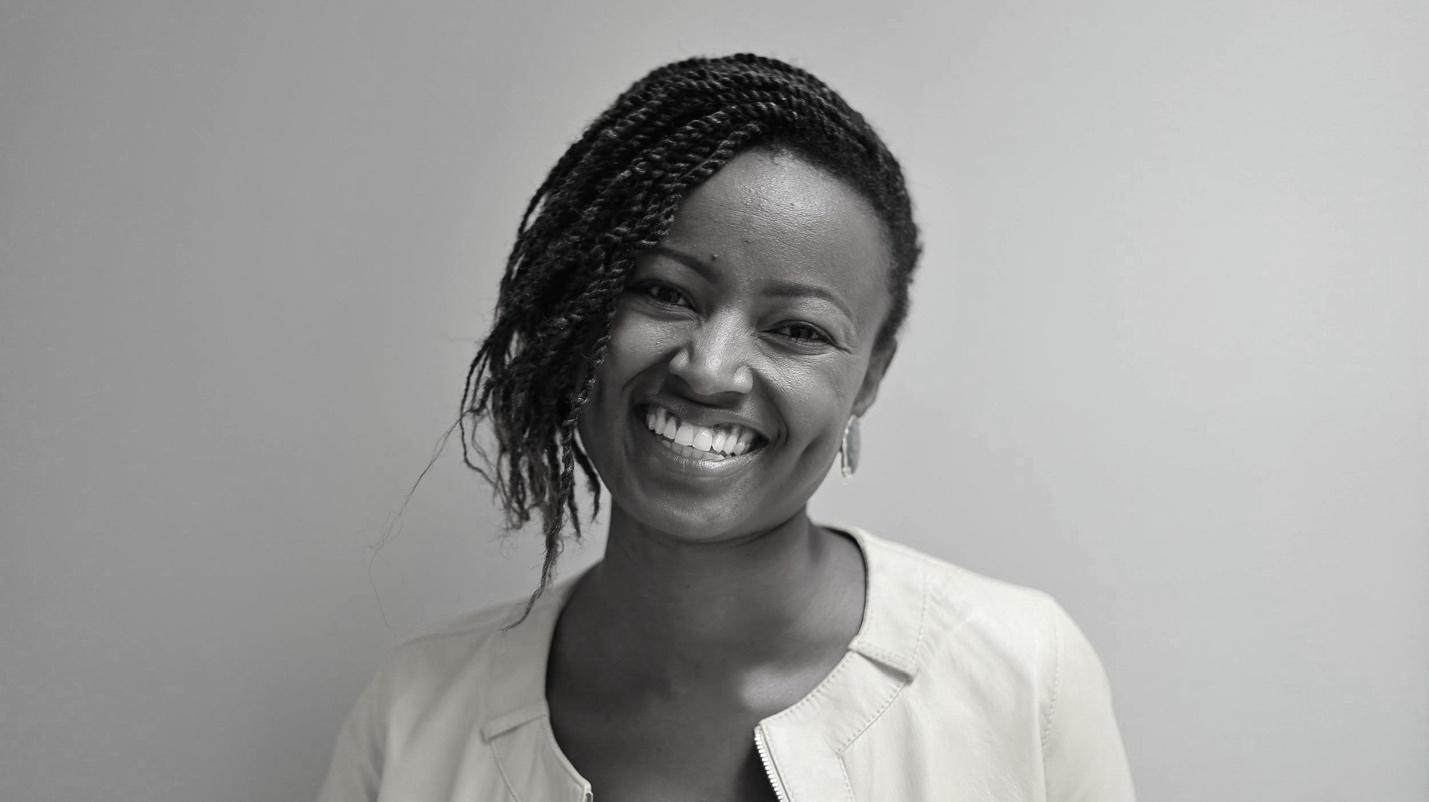
I soon learned the whole complicated story: Wairimu explained that Tmah was JC’s wife and that he and Tmah had a child together. I also found out that he was paying
Wairimu’s university tuition and rent and had taken her on vacations and business trips. Wairimu knew that he was married though not to me and said she was only with him for his money. Soon after that call, I tracked Tmah down on Facebook and introduced my self as JC’s wife. We agreed to meet. She confirmed that she had a baby with JC and that she thought of him as her husband. She believed I was his ex- wife. Tmah had been to my home and had even met my children. I knew JC was a cheater, but discovering the extent of his lies made me sick. He’d been leading at least three separate lives.
My new knowledge of Tmah and Wairimu’s existence prompted another concerning thought: money. How could JC afford to support two households plus a girlfriend? I was convinced that he was stealing money from his employer. Doing some quick math, I calculated JC’s monthly expenses to be about 2.5 million Kenyan shillings roughly $28,000 today a lot of money anywhere, but a fortune in Kenya. My suspicions were soon confirmed when I found receipts for large, irregular wire transfers from his organization to his personal bank account.
When I confronted JC about Wairimu and Tmah, we fought brutally. I shouted everything I’d learned from her. My throat hurt, but the more I screamed, the more energized I felt. At one point, I walked toward the kitchen. JC followed, grabbed my shoulder, sla pped me hard across the cheek and yelled at me to never use his phone again.
Something came over me that I hadn’t felt in my entire life sheer rage. Without thinking, I rushed over to the bar beside the dining table, which was lined with wine, glasses, carafes and JC’s collection of cognac and whiskey. I swept my hand across the co untertop and everything came crashing down. The bottles shattered on the ceramic
floor, glass and liquor exploding across the room. “Well done, Ciro! Well done!” JC said, clapping and laughing hysterically. He took pictures of me and the mess on his phone.
I immediately regretted my actions. I’d just handed JC exactly what he wanted: photographic evidence that I was an unwell, unfit mother. Within a month, JC moved out and took Naima with him. I pleaded with him to leave her behind, but he just started shout ing at me. I decided that I would seek help later, when it was safer, to get Naima back.
JC rented an apartment in a posh neighbourhood. He started telling everyone we knew that he was a single father and a victim of abuse, and they believed him. I felt worthless, lonely, empty. And JC wouldn’t leave me alone. He often showed up at the house u nannounced, arriving in the middle of the night. He was convinced that I had lovers and that he would find them hiding, so he’d ransack the house. I went to the police for help, but it became clear to me that either they didn’t care or he’d bribed them to look the other way.
O n the night of April 17, 2015, I was watching TV in the living room when JC let himself in. He had brought a sleeping Naima with him, who was quickly ushered upstairs to bed. I could tell that JC was agitated, but I still wasn’t prepared for what happened next. Without a word, he started choking me, demanding I confess that I’d been sleeping with other people. I tried to break free from his grip, but he was too strong. When he finally threw me to the floor, I played dead. It didn’t fool him for long. He pun ched me in the face so hard that I was sure my jaw was broken. I begged him to stop, insisting that I wasn’t sleeping with anyone else, which was the truth. He wouldn’t hear it.
He took my phone, pressed record and demanded that I list the names of everyone I’d cheated with. He told me he’d been monitoring my emails and had paid someone to follow me, and that they’d seen me get into a car with another man. That was true: it was an acquaintance who’d given me a ride home from the grocery store. If I refused to confess, JC said, he would put a knife through my stomach. He then dragged me to the bedroom, locked us in and, over the next several hours, physically and sexually brutalized me.
At one point, he told me that he could kill me and get away with it. I believed him. I begged him to stop. I begged God to make it stop. I was in excruciating pain. But JC only laughed. He told me, “Today you will be history.” Around 3 a.m., still in a bli nd rage, JC finally left the room and went downstairs to the kitchen. I could hear him rifling through the drawers. I knew he was looking for a knife.
My survival instincts kicked in and I ran to the study, opened the door to access a small balcony and climbed onto the roof. It was pouring rain. I shouted at the top of my lungs for help. The neighbours’ security lights flashed on. I could see JC, who had started to follow me out, retreat inside. The rain pounded my raw, naked body. Looking down at the driveway, I saw JC put Naima in the car and drive away, so I climbed back inside. It hurt to move, but I knew I had to. I wrapped a blanket around my body a nd walked to the bathroom mirror. I almost didn’t recognize myself: my head looked like it had doubled in size, my eyes were blood red, I had scratches and bruises all over my face, and my lips were swollen. I looked like I’d been hit by a truck. I needed to get to a hospital, but there were no phones in the house: JC had stolen mine. I had my school van, though.
I managed to drive myself to the police station. When I explained to the officer on duty that I needed to be taken to the hospital, he turned me away, saying that there must have been a good reason I was assaulted. “Enda ukalilie mamako,” he told me. Go an d cry to your mother. I figured JC had driven to the station first to bribe the officers. From there, I went to the Nairobi Hospital. Doctors treated me right away; I was taken for an MRI and then admitted to the High Dependency Unit. I awoke a few hours l ater, horrified to find that JC had snuck into my hospital room. I started screaming and pressing the bedside emergency buttons. Security guards apprehended him and escorted him out of the building. From then on, there was a 24 - hour guard stationed outside my room.

I was in the hospital for 10 days and required several surgeries, including one to repair my stomach and another to fix my eardrum, which had been ruptured. After I
was discharged, I went back to the local police station in Ngong to press charges.
About a week later, JC was arrested and charged with assault causing grievous harm. He was released on bail and told to appear in court within 48 hours. He didn’t show, but the police did nothing. He began to harass me, trying to get me to withdraw the case. He refused to let me see Naima and threatened to finish what he had started.
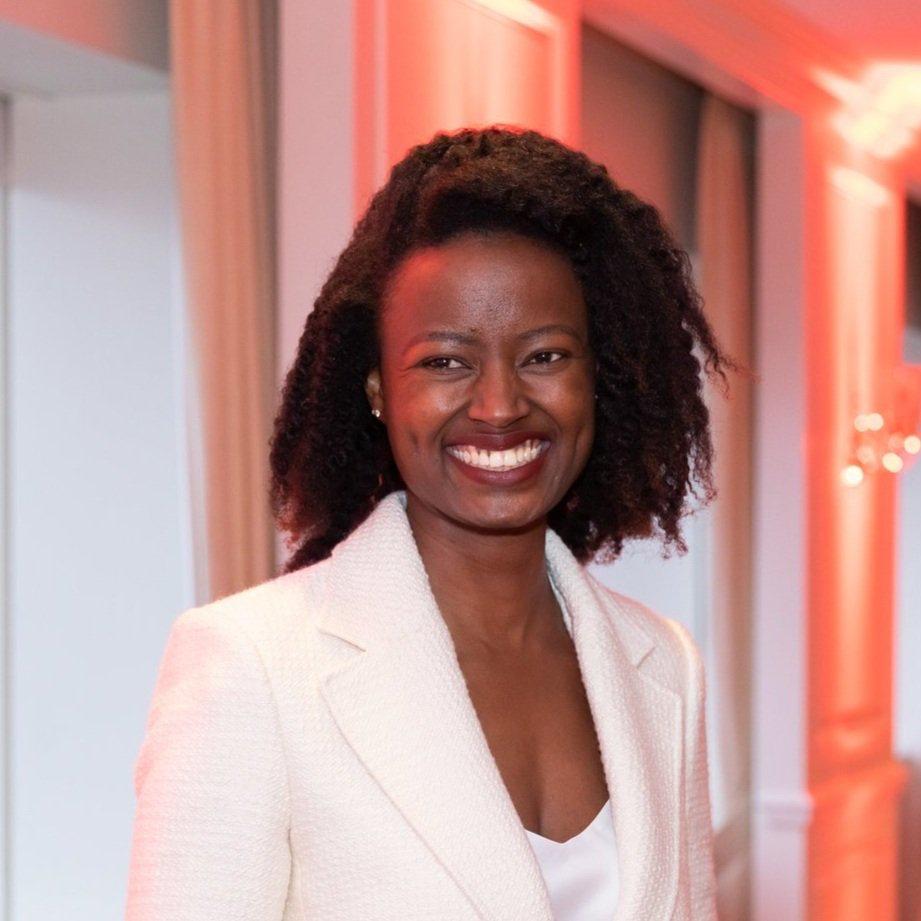
I tried to resume my life, including my work at the school, but I was too traumatized. I couldn’t sleep, and when I did, I had horrible nightmares. My life was in danger, and the police weren’t going to help me. More than anything, I wished to see Naima. Fed up, I reached out to a national TV news reporter and told my story. I hoped that going public would put pressure on the authorities to arrest JC and help me get my daughter back. I wasn’t afraid of the attention or potential backlash. The worst had alre ady happened.
The story aired in May 2015, around the same time that JC was finally arraigned in court only to be released shortly afterward. Soon, both he and the Ngong police department began pressuring me. The police threatened to arrest me under false charges. One o fficer told me that she could make me disappear. But I wasn’t ready to give up. I kept speaking out, appearing on another national TV segment. Eventually, in July, the gender - based violence division in Nairobi took on my case. JC was additionally charged w ith sexual assault.

But my victory came at a cost: in December, I received a credible tip from somebody in JC’s inner circle that my life was in imminent danger. I needed to get out of Kenya, at least for a few weeks, and I needed to do it immediately. Wanting to get as far a way as possible, I reached out to a friend in Toronto, who invited me to stay with her. I had few other options if I wanted to live .
I arrived in Toronto in January. When my friend heard what I’d endured back in Kenya, she encouraged me to seek asylum in Canada. I learned that JC had recently fled Kenya, taking Naima with him, and remained a free man. I knew that, as long as that was the case, I wouldn’t be safe in my home country. He continued to tell me that
I’d never see Naima again unless I cleared his name. I faced a painful decision. I could take my chances and return to Kenya, but what good would I be to Naima if I were dead? If I withdrew my case, as JC wanted, my safety was still not guaranteed and what kind of role model would I be to my eight- year - old daughter? I wanted her to grow up to be the kind of woman who fearlessly stood up for herself. I moved to Sojourn House, a refugee shelter in downtown Toronto, started reading about refugee support groups in the city and began the process of applying for asylum. In May 2016, I was declared a Protected Person and was invited to apply for permanent residency.
JC was still keeping Naima from me, and I had no way of reaching her. I wrestled with guilt, torn between my desire to get justice and a desperate yearning for my daughter. I felt her absence like a void in my gut and often began sobbing when I saw young g irls with their mothers. I was also struggling with severe PTSD from the attack I was jumpy, always on edge. I started seeing a psychologist, who referred me to a program at the Canadian Centre for Victims of Torture. Slowly, with the help of a great thera pist, my mental health improved.
In early 2018, I was hired as an administrator at a government office. I moved into a shared basement apartment for $500 a month. One of the things that kept me going aside from a belief that I would someday see Naima again was my school in Kenya. Without someone there to run it, it had closed. But, all these years later, I still had the small piece of land my father had left me. My grandfather suggested that I open a school on it, and he offered to help run it. I saved every penny that didn’t go toward ren t or food. I began speaking to my friends and colleagues about the project, and to my amazement, many of them wanted to donate money. I started to really believe in myself when a co - worker donated $5,000.
By September 2019, I had enough money to open a four - classroom school on my plot of land. I ran it from Toronto, with help from the local community. But I still didn’t have a reliable major donor. To help fix that, I registered an official charity called P endo International Projects. Now, individuals and businesses had the incentive of a tax receipt. Pendo has since grown to accommodate seven classrooms and 90 students ages three to six. This past fall, I received the prestigious Echoing Green Fellowship, w hich will provide me with $80,000 (US) toward my next goal: to franchise the Pendo school and develop a manual to help other women to build similar ones. I want to provide opportunities for young children and African women who are trying to overcome adversity and make a difference in their communities.
I believe that education saved my life. If I hadn’t learned to be self - sufficient when I was young, at school and at home, I wouldn’t have survived. That is the message I want to send to my community back in Kenya: that even an AIDS orphan from the slums who experienced horrible things in life was able to rise up, dust herself off and move on. In many ways, my life started anew in Canada. In 2016, I met and fell in love with a wonderful person. For the first time in my life, I’m in a loving, respectful and equitable relationship that’s built on trust and understanding. I owe much of what I’ve accomplished to my partner’s unfailing support.
Last February, I gave birth to our beautiful baby girl. The three of us live in the GTA, where I’ve embraced the cold Canadian winters by taking up snowboarding. I can even hack a double black diamond. I’d been put down for so long that I’d started to bel ieve I was a lost cause, unworthy of love. For so long, I didn’t have the energy to enjoy life. But now I feel like I’ve been reborn and can do anything I set my mind to. I still think of Naima every day, and I often feel guilty for choosing my freedom and safety over her. JC has not allowed us to have any contact. Yet I remain hopeful that I will see my little girl again someday. When I do, I want her to look at me and think, Wow, I have a strong mama.

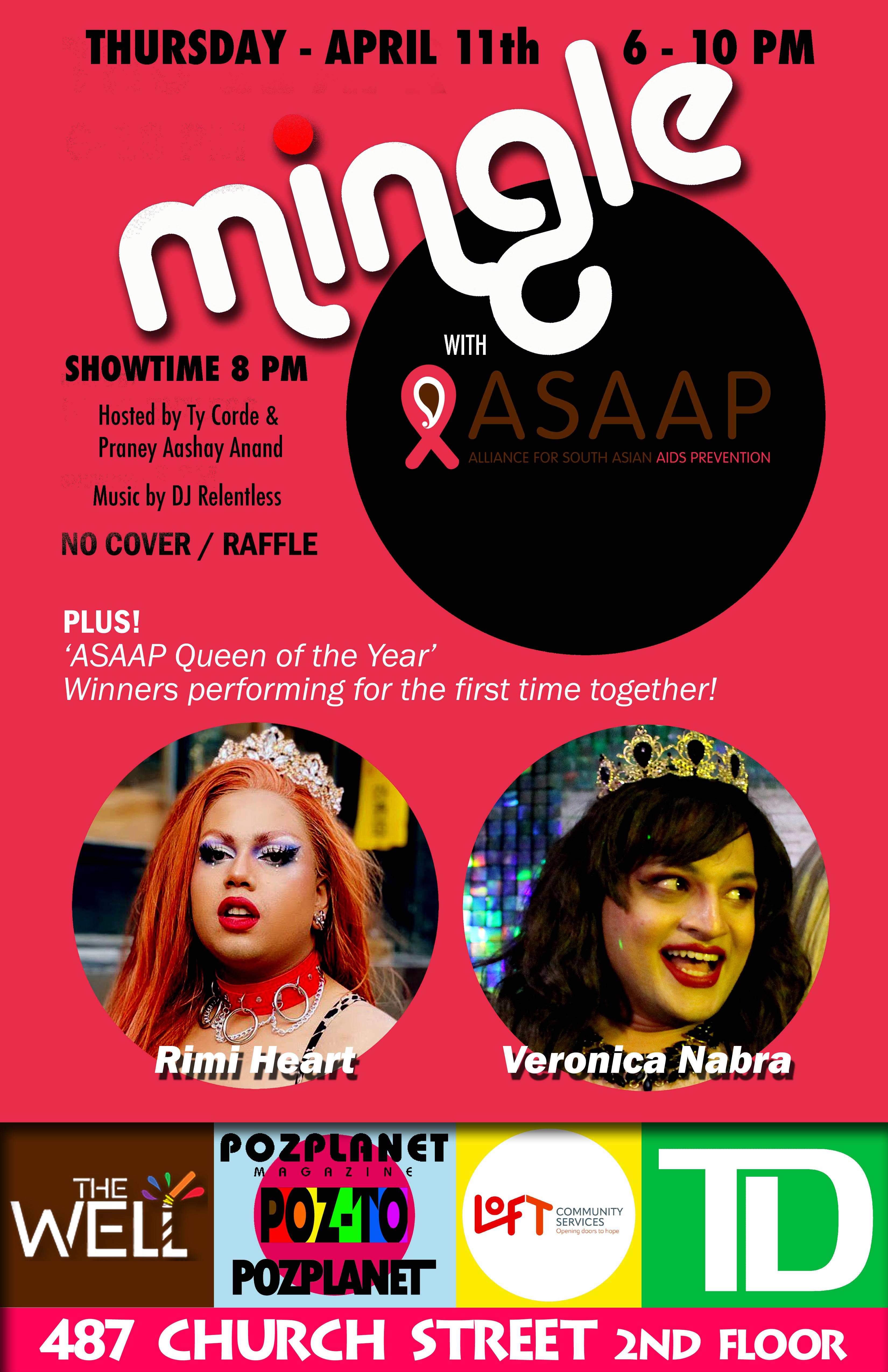
"He has been threatened, isolated and deprived of food and sufficient water because of his sexual orientation and health condition" adds Manuel Guerrero Aviña's brother Manuel Guerrero Aviña (Images: Pexels/Manuel Guerrero Aviña)

Manuel Guerrero Aviña, a dual British-Mexican citizen, has been arrested in Qatar after falling victim to a police-led Grindr sting.
The former British Airways manager was detained on 4 February 2024 after replying to a fake message on the app.
Gay sex in the conservative Muslim country is punishable by up to seven years in prison, and carries the death penalty under Sharia law, although this is unenforced.
Family members allege Manuel is now being tortured in prison by being denied life-saving antiretroviral medicines for HIV.
A Foreign Office spokesperson has confirmed in a statement: “We are providing consular assistance to a British man who is detained in Qatar and are supporting his family.”
Manuel’s brother Enrique has told The Mirror his brother has been arrested for “being gay”, adding: “Qatar police used a false Grindr profile to contact Manuel and invite him to participate in a meeting with other people from the LGBT community in the city of Doha.
“Manuel was supposed to meet a person he thought he had arranged an appointment with on the night of February 4 but instead encountered police officers who were waiting to arrest him arbitrarily.”
Enrique, now leading the QatarFreeManuel campaign, claims drugs were planted on his brother during the arrest.
“From the moment of his arrest, he has been the victim of cruel, inhumane and degrading treatment as well of act of psychological torture,” Enrique added. “Authorities tried to force him to identify in his telephone contacts other members of the LGBT community as well as forcing him to witness the suffering of other detainees while they were whipped. He has been threatened, isolated, deprived of food and sufficient water because of his sexual orientation and health condition.
“He has been denied the right to a lawyer and has been forced to sign documents in Arabic without a translator to assist him. Even worse, he has been been prevented access to antiretroviral medicines he needs to be able to live with HIV, which constitutes an act of torture and puts his life at risk.”
A representative for the Mexican embassy in Qatar said in a statement it has been in “constant contact with his relatives and it has confirmed Manuel has legal representation. Given the arrested man has
registered his residence in Qatar as a British national, the consulate of that country in Doha has been the entity recognised by the authorities in Qatar to carry out the relevant consular activities on his behalf. The Mexican Embassy will continue to follow the case along with the British Embassy in Doha, and will remain in contact with Manuel’s family.”
“Self-motivated and enthusiastic individual”
Manual has described himself on LinkedIn as living and working by “my personal motto: ‘Passion for Service’ – British and Mexican passport holder with a strong understanding of the airline business supported with 18 years of experience in a wide variety of roles in different airlines and a degree in business management. I am a strong team player, able to cooperate and work well with peers and senior managers alike to achieve common objectives. Self-motivated and enthusiastic individual with strong communication skills.”
Human rights abuses against LGBTQs in Qatar were put under a global spotlight in 2022, when the country hosted the World Cup.
Former Attitude cover star David Beckham’s ambassadorship for the country infamously led to mass criticism, including from Joe Lycett and Attitude editor Cliff Joannou.
Find the original article and more at: https://www.attitude.co.uk/news/british-mexican-man-arrested-in- qatar-460974/?utm_campaign=laterlinkinbio -attitudemag&utm_content=later41483896&utm_medium=social&utm_source=linkin.bio&fbclid=IwAR1M71tPkXAfODkbzteCE11AhNqqb3hSLCBEAEirk4li_SucdlSYC6dJHI

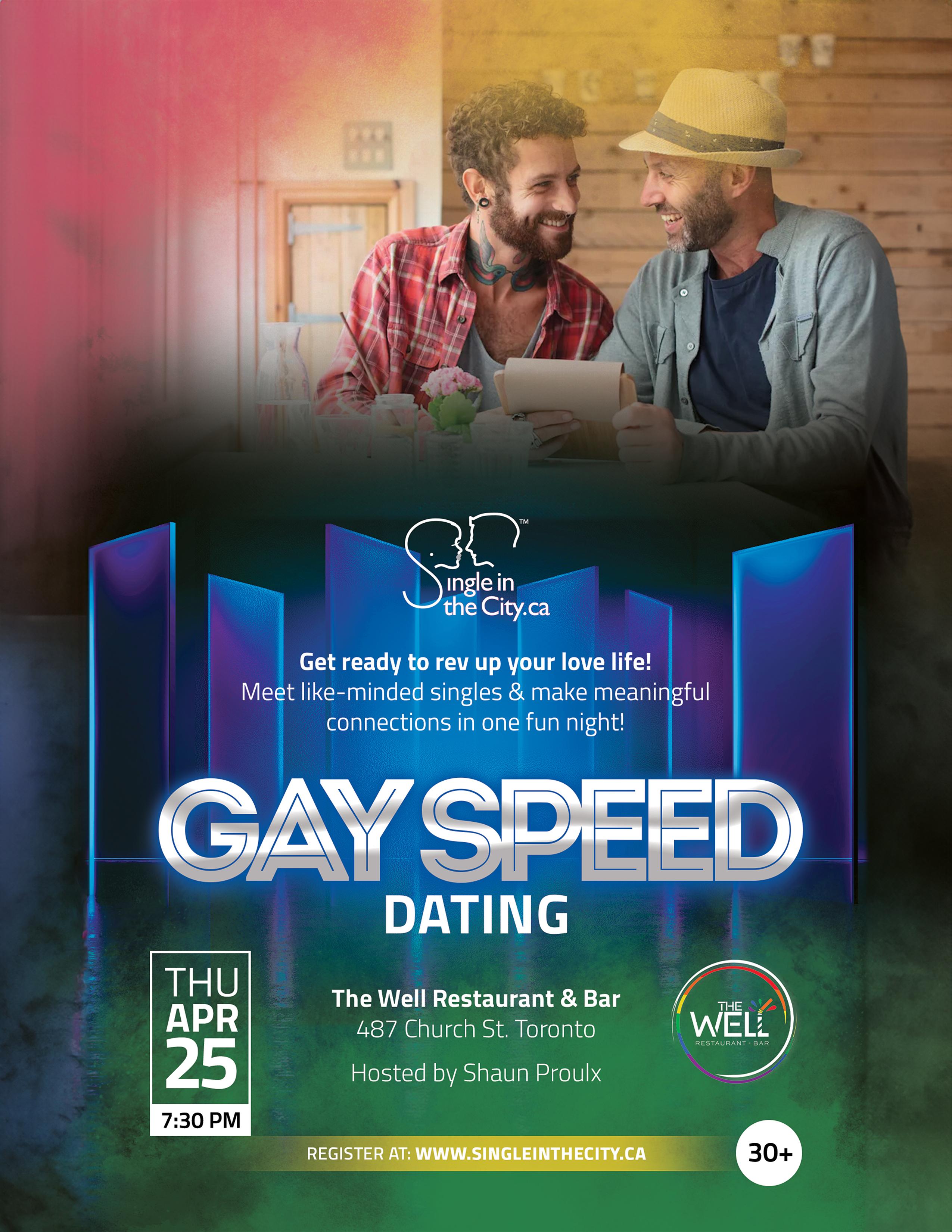

By
https://toronto.citynews.ca/2024/02/19/no-backup-plan-funding-for-hiv-self-testing-kits-ending-in-march
Prossy
The program co-ordinator at CAYR Community Connections in Ontario says the takehome tests are crucial to connecting with people as Canada’s HIV infections climb.
But the groundbreaking initiative to provide the kits across Canada is in peril, as funding runs out at the end of March.
“What will happen after the funding ends?” Luzige asked. “What kind of answer are we going to give such community members?”
The federal government indicated it is looking to sunset the self-test program, said Sean Rourke, a scientist who was a principal investigator in a study that helped get the tests approved in Canada.
“There is no backup plan here,” he said.
Rourke is also a director with REACH Nexus at Canadian Institutes for Health Research, which facilitates purchasing and distribution of most of the tests.
“This program has worked,” he said. “There’s no question.”
The test, called INSTI, uses a drop of blood to deliver results in about a minute. The program was to expand to include a test for both HIV and syphilis, which was approved by Health Canada last year.
Many front-line workers say the tests are game-changers in stopping the spike in new HIV diagnoses.
There were 1,833 new diagnoses in Canada in 2022,marking a nearly 25 per cent increase from the year before.
Montreal public health officials recorded 310 in 2022, a 120 per cent increase from the previous year, marking the highest number of new reported cases in a decade.
Thousands of other people across the country are estimated to be undiagnosed.
The first self-test was approved in Canada in 2020. Rourke was part of the program to provide the tests on a large scale beginning in November 2022. The initiative was lauded with Carolyn Bennett, the federal minister of mental health and addictions at the time, saying it would “reduce barriers that come with conventional testing methods.”
“Ensuring that everyone in Canada has access to testing and treatment options for infectious diseases like HIV is a top priority for the Government of Canada,” Bennett said in a 2022 news release, announcing a one-time investment of $8 million to purchase and distribute the tests.
An extra $8.6 million was provided to extend the program until the end of next month. No additional funds have been pledged.
“PHAC is continuing to explore options to make HIV self-test kits available to community-based organizations after March 31, 2024,” the Public Health Agency of Canada said in an emailed statement.
Rourke said it doesn’t make sense not to extend funding.
If somebody knows their status, they can live a normal life and won’t infect others, Rourke said. Testing is a key component to stopping the spread, but HIV is still marred by accessibility and stigma.
The self-testing kits can bridge that gap, he said, adding data shows they work.
More than 215,000 kits have been distributed to nearly 400 organizations across the country. There are also websites and information pamphlets for people to get support and health-care information.
Many people who have picked up the tests fill out an anonymous survey, which gives researchers important real-time insight, Rourke said.
Forty-five per cent of respondents said they were testing for the first time. The tests also reached Indigenous and other racialized people, as well as those who work in the sex industry or inject drugs.
One test costs about $35 online.Rourke said through a negotiated purchasing arrangement, it costs the program $10.
“Cost isn’t an issue. This program works. We have data showing that it’s effective. We have engagement,” Rourke said.
“Why not keep on funding it, right? There’s just no good reason not to.”
Concerned front-line workers from across the country have reached out to Rourke and his colleagues about the future of the program.
A girl who was too worried to be tested for HIV in a clinic returned later after learning about the self-testing option, wrote Ontario support worker Ana Kovacevic in an email to REACH.
Tieryn Steele with the Manitoba Harm Reduction Network said there are major issues around stigma and access to HIV testing in Flin Flon, a northern mining city on the boundary with Saskatchewan.
“People walked into my office, who would have never gone to the hospital to get tested, specifically for these kits,” Steel wrote to REACH.
Manitoba and Saskatchewan have the highest rates of new HIV diagnoses. Saskatchewan’s rate is more than four times higher than the national average.
Shiny Mary Varghese, executive director of AIDS Programs of South Saskatchewan, said the tests are especially useful for newcomers who may come from cultures where topics around sex and HIV are taboo.
Varghese said it’s critical that federal funding continues so people know they have HIV, get access to treatment and stop further transmission.
“It’s not a death sentence,” she said.
“As long as they are on treatment, they can have an optimal life.”
EDITOR’S NOTE: So, when you see a fundraiser for organizations that provide HIV test kits please consider donating and supporting. Like in the past, we are going to help ourselves. No one thinks of the AIDS Service organization until they need them. We need to change that.
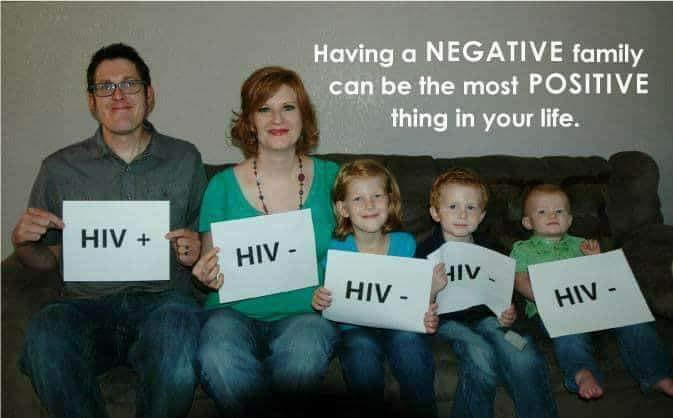 Let’s also not forget our straight HIV+ brothers and sisters in our e7ects to fight stigma!
Let’s also not forget our straight HIV+ brothers and sisters in our e7ects to fight stigma!
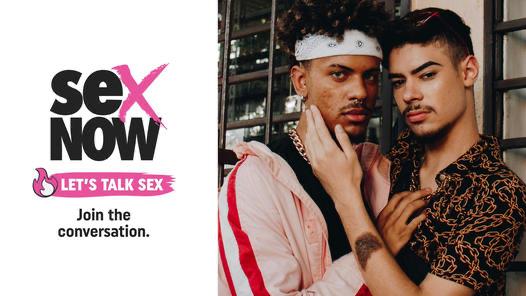
Sex Now is not just about your sex life. The survey takes a holistic approach to your health; from mental well-being, to substance use, to current living situations. Complete it now!
Visit sexnowsurvey.com
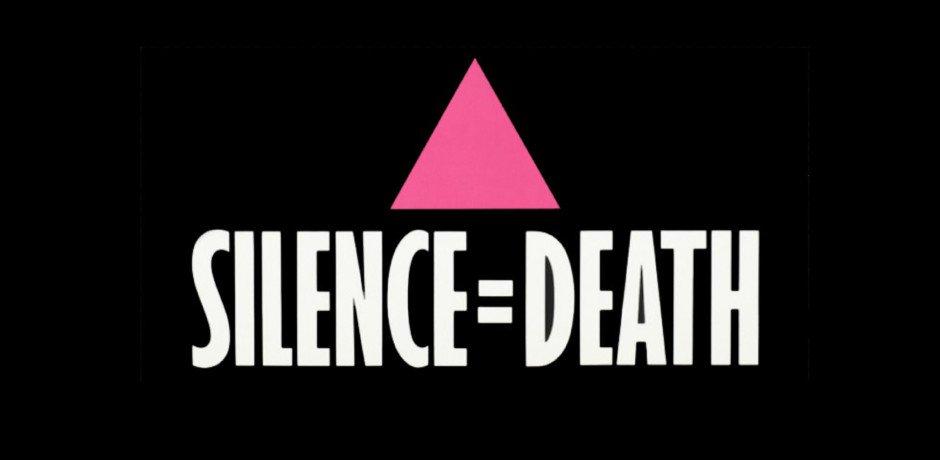
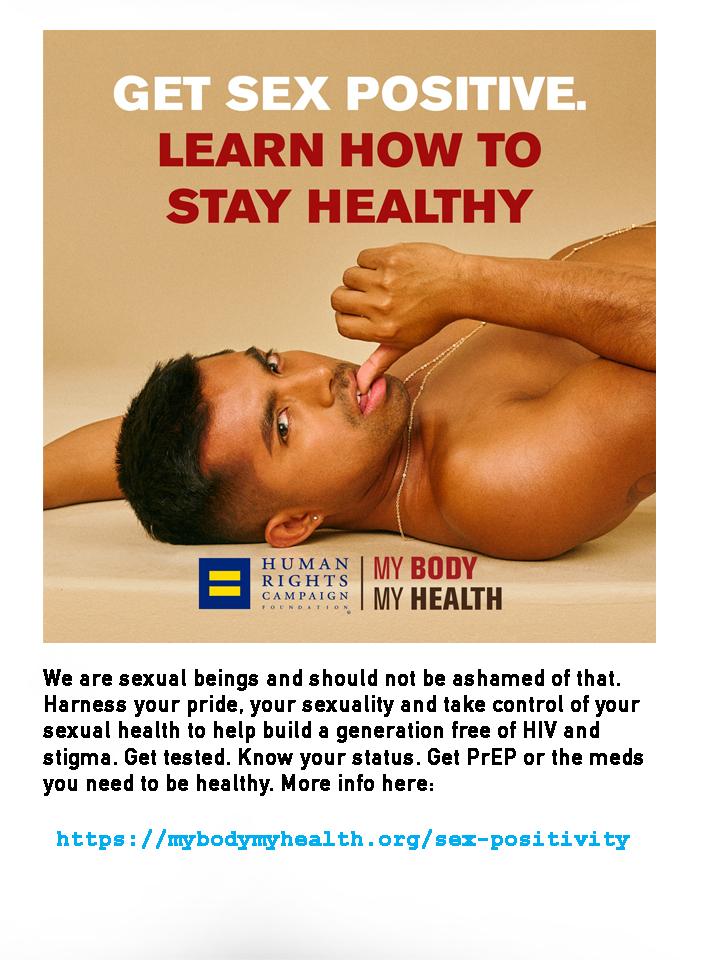
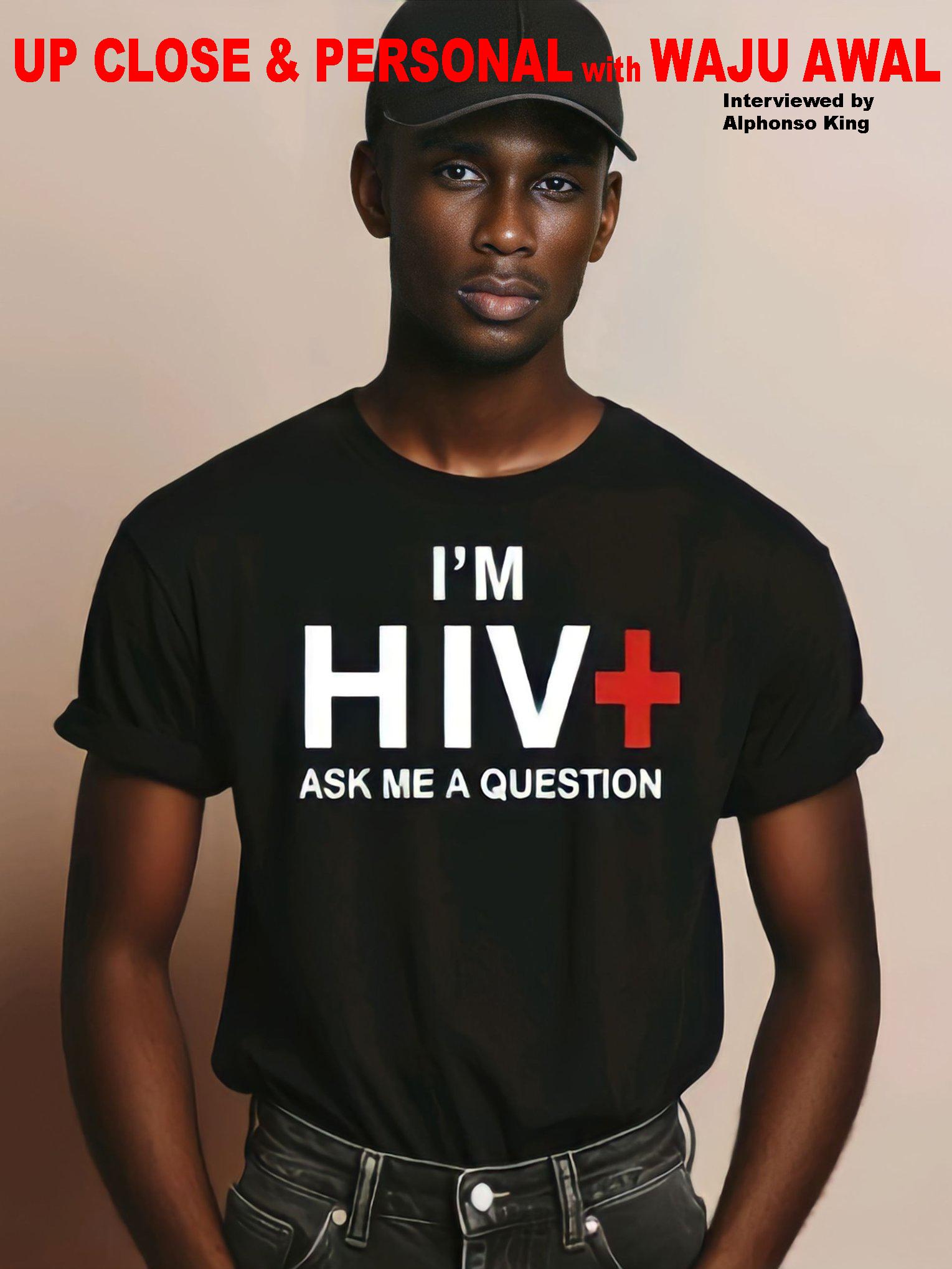
It is so important that we hear about others living with HIV from around the world. It really gives perspec;ve of how far we have come in some places and just how much more work need to do to end the s;gma of living with this disease. That's why I am so please to introduce our readers to South African HIV ac;vist Awal Waju. I came across one of his posts and began following him on social media. What I discovered was a young man really making a difference and challenging the ignorance and misconcep;on of the people of his country.
AK: Awal...it is an honour to chat with you today. How are you?
AW: Thank you! The honor is all mine. I'm doing great, thanks for asking. And it's a pleasure to chat with you as well.
AK: For safety reasons, I will not ask where you live but I'm sure our readers would like to know a little about you. What can share? Maybe, your age...your heritage?
AW: Well, my name is Awal Waju. I'm almost 25 years old, haha. I'm a Queer Muslim person living with HIV from North Central Nigeria, Nasarawa State precisely. Last but not least, I'm a final year student of Journalism and a young activist for LGBTQ+ rights and people living with HIV and AIDS.
AK: You are very young. How long have you been HIV? And what is HIV testing like where you live?
AW: Thank you! I am relatively young, but I'm grateful to have access to quality HIV care where I live. I was diagnosed with HIV at the age of 17 and I have been on treatment ever since. I'm happy to say that I'm in good health and my viral load is undetectable.
The HIV testing system where I live is quite good. There are many options available, and the tests are free and confidential. I think it's great that there are so many resources available to help people get tested and treated for HIV.
AK: Even though Canada has been one of the first countries to recognize and promote U=U, it is still not a very well-known fact here. Whenever I speak at events or schools, I always stress the importance of having conversations with friends and family about the science behind Undetectable Equals Untransmittable. Is it difficult to promote and talk about U=U in Nigeria? Is there a movement to educate the population?
AW: Thank you for raising this really important issue U=U is an important message that needs to be spread far and wide. It's true that there are still many people who aren't familiar with the science behind U=U, even in Nigeria. There is a movement to educate people about U=U, but there is still a lot of work to be done.

AK: Online you call yourself "The HIV Model". How did that title come about and are you actual a fashion model?
AW: It's just a lighthearted way my best friend used to call me as a person who’s focused on HIV education. That was how a few other friends picked the name and started referring to me with it. Yes, I'm a fashion model but a free freelancer. I do little campaigns and adverts with few small brands. I dream of walking in big fashion events around the globe. So, please if you are a scout or an agent reading this, (laughs) Awal is ready and available to be signed please.
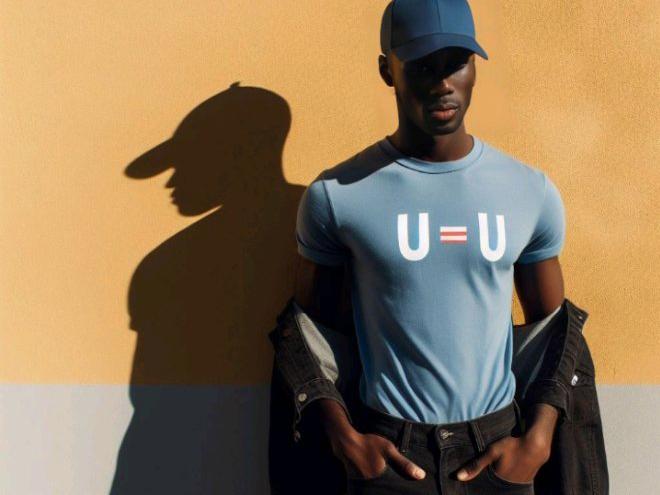
AK: I was looking through some posts of yours and came across a video of a pastor's personal assistant declaring that "homosexuals should die, a committee that cuts off their heads should be established." The other post was about a fellow activist. I was wondering if you could tell us how you feel about the hateful statement and who is Steven Kabuye?
AW: I find that statement to be deeply disturbing and offensive. No one should ever advocate for violence against others, let alone call for the death of an entire group of people. This kind of hatred and discrimination should have no place in our society. We
should all be working to create a world that is safe and accepting for everyone, regardless of their sexual orientation.
I think it's crucial for religious leaders to understand that their words have a powerful impact on their followers. When they preach hatred and discrimination, they are creating an environment where violence and hate crimes can flourish. No one's faith should be used as an excuse to promote violence or hate, and I would urge all religious leaders to think about the impact of their words before they speak. I also think it's important to remember that all people, regardless of their sexual orientation, deserve respect and compassion. No one should ever be made to feel like they don't.
Back to Steven. Steven Kabuye is an LGBTQ+ rights Activist from Uganda who almost paid the price with his dear live, after he got stabbed few months ago in broad day light. Steven is a great guy and I adore him a lot In fact, I can't wait to see him in person and tell him how amazing he is.
AK: Last June for our Pride month issue, I interviewed Reverend Jide Macaulay. You recently did a speaking engagement together back in January. How was that experience and what is it like to be so open and out about your HIV status?
AW: That's so amazing that you got to interview My Role model Reverend Jide Macaulay! They are such an inspiring leader in the LGBTQ+ community. It must have been an honor to speak with him. As for my own openness about my HIV status I believe that visibility is critical to normalizing and destigmatizing HIV. The more we talk about it, the less fear and shame there is around HIV. I hope that by being open about my status, I can help others feel less alone.
AK: Well, I so appreciate the work that you do. We need more people to stand in their truth and disclose. As I always say "We cannot change minds and laws hiding in a closet." Before I let you go, I have one more question. What advice would you give to someone who has been newly diagnosed with HIV?
AW: Thank you for your kind words! I completely agree that visibility is key to making change happen. As for your question, the first piece of advice I would give to someone who has been newly diagnosed with HIV is to take some time to process the news. It's a big thing to take in, and it's important to give yourself space to feel whatever you are feeling. The second piece of advice I would give is to find a support system, whether that's a friend, family member, or a support group. Having a community of people who understand what you are going through can be a lifeline.
AK: What is the LGBT scene like in Nigeria? I've seen a few videos of drag performers. Are there underground clubs or parties?

AW: The LGBT scene in Nigeria is complex and nuanced. While there are laws that criminalize same sex relationships, there is also a vibrant underground scene of drag performers, parties, and other events. The majority of these events are kept secret, as they could be shut down by the authorities if they were public. Despite the challenges, many LGBT Nigerians have found ways to express themselves and find community. It's important to remember that the experiences of LGBT people in Nigeria are not monolithic, and there is a wide range of experiences and perspectives. I hope that one day, the LGBT community in Nigeria will be able to live openly and freely without being prosecuted for simply existing.
AK: Thank you so much for doing this interview and I hope that our paths cross in person one day. I'd like to shake your hand for being the brave individual you are. And if you have any online events that you'd like promoted in POZPLANET, please contact me and we'll share it.
AW: Aw, thank you so much for the kind words and the offer to promote my work! That means a lot to me. I really enjoyed this interview, and I'm so grateful to be able to chat with you about these important issues. Hopefully we'll get to meet in person one day. Until then, keep doing the amazing work that you're doing. You are making a real difference in the world.

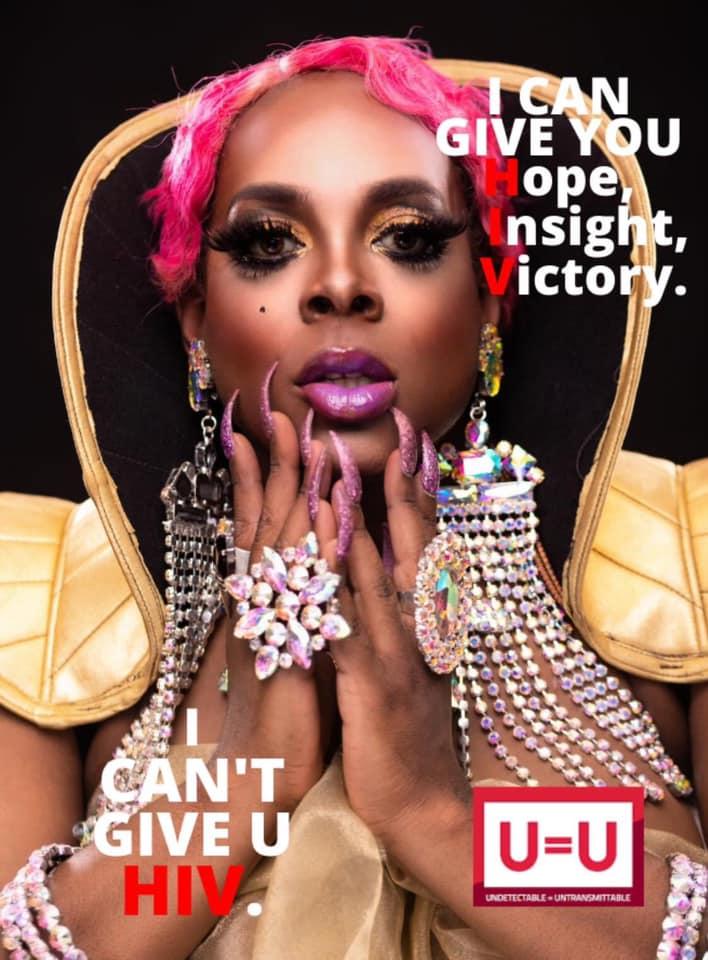

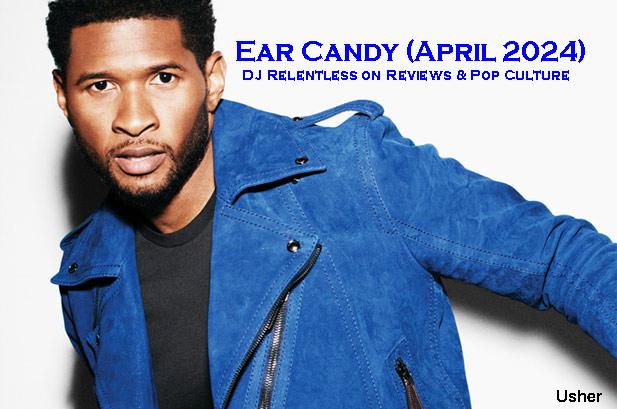
Listen to the mix here: https://www.mixcloud.com/djrelentlessny/ear-candy-april-2024
Download your free video of this mix here: https://mega.nz/file/M7cHiCJS#WLRJecwliIDbD13iDCoLW4n6KxsqZSXTY02Qw-Bh4jg
Check out DJ Relentless’ Mixcloud page: https://www.mixcloud.com/djrelentlessny
Check out DJ Relentless’ HearThis page: https://hearthis.at/djrelentlesstoronto
Wow…it seems like I was just writing about New Year’s Eve! Now it’s already April and we’re kissing spring. I’ve got twenty-one tracks as a soundtrack for this month and lots of current events to talk about. Note: written before Beyonce’s album dropped.
So, let’s get started, shall we?
Besides Taylor Swift proving what I said last month about Jay Z’s comments during his acceptance speech, I wasn’t mad at most of the winners at this year’s Grammys. I could have vomited when Taylor pretended that she was surprised that she got “Album Of The Year”, Other than that it was a great night. And when Celine Dion walked out, I almost lost my mind. The internet would have you believe she was on her death bed and would never be able to sing again. Well, apparently Celine dispelled those rumors when she sang an impromptu song backstage with R&B singer Sonyae Elise
So, shortly after Sonyae posted the video on social media a really hot mashup by The Jammin’ Kid of Celine’s “I’m Alive” and 80s R&B/Funk hit “And The Beat Goes On” by The Whispers. And then DJ DigiMark did a video edit for it. I just had to start our mix with this new classic! Love it! Love it! Love it!
As much as Rihanna fans would love to have another album, I honestly think you won’t see one for a while. And this is why it seems every other month remixers are digging up her past hits and giving them a makeover. And while I have about six different new 2024 remixes of her tracks, I chose the JVDOT Drogba Remix of “Diamonds” to compliment the lyrics of “I’m Alive”. And I know I dogged Afro Beat last month, but it actually works for this one and the next couple of tracks to give them a different feel and vibe. Perhaps I’m just too American but I like the production on songs that weren’t originally in that genre.
I listened to the original of “Ruin” by Usher featuring Pheelz and it was okay, but the Major League DJz Club Mix made me like the song a lot more. It made it sexier and reminded me why Usher is so popular right now. Apparently, his residency in Vegas is doing quite well and he just got Entertainer Of The Year at the NAACP Image Awards.
And the Afro Beat production added to our fourth track really reinvented “Candy Shop” by 50 Cent featuring Olivia. It’s a nice way to revisit this 2009 Hip Hop classic. After 50 endorsed “45” in the 2020 election he really fell off my radar. And even though he reversed his endorsement before the election, he and Snoop Dogg can suck a bag of dicks as far as I am concerned. Worrying about tax breaks over what’s best for our democracy is exactly how we got in this mess we’re in right now!
 I am so here for the new Cardi B! With the music from 2001’s hit “Get Fucked Up” by
I am so here for the new Cardi B! With the music from 2001’s hit “Get Fucked Up” by
Iconz and her excellent flow, how could she not have a hit with “Like What (Freestyle)”? And she looks amazing in the video. I wasn’t sure about her posting a video on twitter of her missing a tooth. I’m sure it’s been replaced by now. But good on her for keepin’ it real.
Our sixth selection is Ariana Grande’s follow up to “Yes, And”…”We Can’t Be Friends (Wait For Your Love)”. From the second I started listening I immediately thought of “Dancing On My Own” by Robyn. And it was a pleasant surprise to see Evan Peters cast as her love interest in the music video. He’s such a great actor. As for the song, I haven’t heard a remix that I liked yet. The original is okay but not something I personally would rush to play.
Selena Gomez seems to be pumpin’ out the Pop singles and her latest, “Love On” is quite catchy. I was really excited to hear that she has been cast as Linda Ronstadt in a bio pic. This should be the perfect vehicle for her and could launch a serious acting career for her. It’s nice to see good things happen for good people.
It’s weird to think that it’s been sixteen years since the release of “LoveGame” by Lady GaGa. The years have flown by. But you know, whatever was a hit will come back again and I guess the Kupyd Remix is a reintroduction for the young ones now. It’s a nice refreshment of this Pop classic.
And Pop Diva, Dua Lipa seems to be able to do no wrong these days. The Kevin Parker Club Mix of “Training Season” will be the version I will be playing. I’ve heard several other remixes and they either went too far from the original production or they just destroyed the song with what I call that sneaker-in-the-dryer Circuit sound.
And I knew there would be a slew of remixes for “Texas Hold ‘Em” by Beyoncé. I’ve heard mashups from with Luther Vandross’ “Never Too Much” to “Valerie” by Mark Ronson featuring Amy Winehouse. And of course there’s plenty of Club productions, but the Dave Audé Remix is probably the best one if you want to keep that Country feel but add a dancefloor stomp to it. I’m so glad that she is re-educating Country radio stations in the U.S.
The eleventh selection is another classic remixed. Ever since S.O.U.L. System re-sang Bill Withers’ “Lovely Day” back in the 90s, I always wished there was a proper House remix of gem. Well, I finally got my wish. The Jet Boot Jack Mix is a great reboot to introduce this to a new audience. For me, it is always a good thing to reintroduce singer/songwriters who have had such an influence on where music is today. Thank you, Mr. Withers
I always support as many of our LGBT artists as I can, and Troye Sivan is one of my favourites. The Fragile Future vs Ben Rainey Mashup for “What’s The Time Where You Are” is a nice addition to my library and for upcoming Pride mixes.

After his duet with Elton John on The Brit Awards in 2021 of the Pet Shop Boys’ classic “It’s A Sin”, I knew it would only be a matter of time before Olly Alexander would branch out as a solo artist from the UK group, Years & Years. I mean…he practically carried the UK drama mini-series “It’s A Sin” as his character Ritchie Tozer. So, I was excited to see his latest single “Dizzy” drop. I like the track and of course I am looking forward to some remixes.
The fourteenth track in our mix is the DJ Kala Remix of “Doctor (Work It Out)” by Pharrell Williams featuring Miley Cyrus. I’m scratching my head over why Pharrell felt that his name needed to be listed as the artist and Miley is the feature. This is a Miley Cyrus song, and he just produced it. But I guess since he hasn’t had a hit in a while, it must be an ego thing. The original version is a banga and this remix will do well for a big floor.
I have no idea what the title “Von Dutch” has to do with the latest single for Charli XCX but I guess it’s something different to catch the eye. The track should be called “I’m Your Number One” for as many times as she says it in the song. Don’t get wrong…I like the track. It’s got a good energy and feels like it would be a floor filler in the right set. I’m just lost with the title…that’s all.

What’s old is what’s new…I always say. And in music, doing a cover of something old can be a great way of stepping into the arena. Heidi Klum with the help of DJ/Producer Tiësto has done a cover of Corey Hart’s 80s classic, “Sunglasses At Night”. First, I have to say that she looks great in the video. It looks like an advertisement with all the beautiful people and I’m sure it will be soon. I like this. It’s simple and slightly updated.
The seventeenth track is “Boobs” by Little Big. I assume this group is sticking to their sexually themed lyrics and titles to keep their creds as the ones who serve up silly dance songs about sex. And even though the title is “Boobs”, I think they say “I Like Your Ass” a lot more. This is not a serious track, but I do hope that Licious The Daddy gets a hold of this one like he did with “Big Dick”.
And to continue down this theme we have the Stevie Psyclone’s 8 Inch Mix of “Whale Cock” by Kim Petras. I know a lot of young people love Kim Petras. They think it’s great that she’s livin’ huh best life by spewing lyrics about being a slut. All I can think about is what message is she sending to other young trans kids out there? Is she saying get a set of breasts and promote what you like to do sexually all the time? Because if you watch the video, the shot of her coming out of the pool really shows that she has no hips at all! Somebody needs to tell her that she’s not serving what she thinks she is. And I know straight white guys love big tits, but women have hips. And is this SLUT POP going to be her legacy. I mean…she’s a Grammy winner. Shouldn’t she
be trying to get another one? Yes, Madonna did a lot of sexually themed records over her career to cultivate her legendary status, but she also did real Pop songs along the way. You have a voice. Think beyond yourself! You should be using it to better your community and uplift it Don’t give the Far Right ammunition to use in their attacks on the LGBT Community! I hope your publicist or agent sees this. ‘Cuz somebody needs to sit you down and have a conversation about your future.
And now let’s move on to something more cultural for our nineteenth track. I tried to look up what language this was and found nothing. All I could find was this descrption: This is a deconstructed Logic Pro Remake of "Mwaki" by Zerb featuring Sofiya Nzau. The track offers a wealth of knowledge about contemporary Music Production Elements such as Transitions, Drums, Beatmaking, Sub Basses, Mid Basses, Synths, Fx, Song Structure, and Vocals. I have no idea what she is saying but I am drawn to the sound of her voice and the rhythm that Tiësto has created for his VIP Remix

Here's another track that I don’t understand a word of but love the artist. I’m talking about my next husband, Bad Bunny. I don’t know what it is, but I melt when I see him or hear him. Makes me remember when I was a resident at Escuelita (NY) with all those gorgeous Latino go-go boys. He reminds me of a couple of them that I may or may not have been intimate with. I’ll never tell! Anyway…the Michael BM & Jayie Remix of “Baticano” has a great energy and the video is a homage to 1922 German vampire Nosferatu. This would have been amazing for last Halloween, but I’m ready for this year. I’m just wondering if Bad Bunny will every attempt an English album. Would it be
a hit? Would his fans be receptive? I don’t know. But he can sing to me anytime.
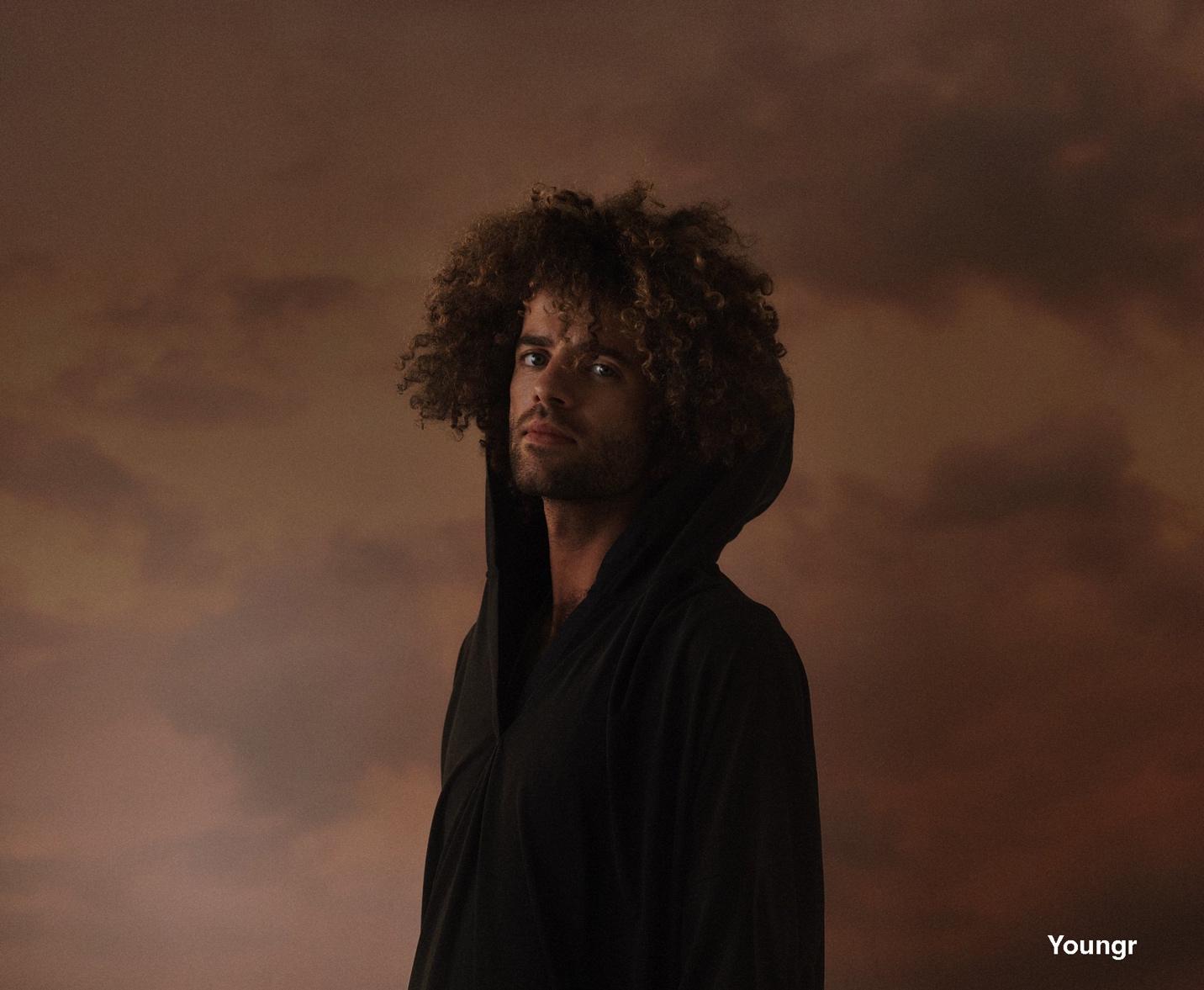
For those of you who don’t know: Youngr is a British singer, songwriter, producer and musician. The son of August Darnell, he was born in Urmston, near Manchester, England, on February 27th 1989. He began his music career in 2012, forming Liverpoolbased act Picture Book with his brother Lorne Ashley Brigham-Bowes I have reviewed many of his tracks and I think he is a brilliant artist. I don’t believe he is signed to any labels. He literally releases all of his music on his YouTube channel. And in a weird way, I appreciate that. No dealing with labels and PR people telling you what you can and cannot do. Fortunately, he has gained such a following that he can tour as this one-man band. The word that comes to mind is “innovative”. He covers popular songs but he also writes a lot of originals. And our final track for this month’s mix is his House offering “I’m Not A DJ”. The funny thing is…given that he plays all these instruments, and it seems like he can play anything I would say he is a DJ. He is the DJ of the future. His possible sets are infinite because it all comes from his abilities. So, while he gives a roll call of some of the big names, he is giving us life with skills and a new creativity.
